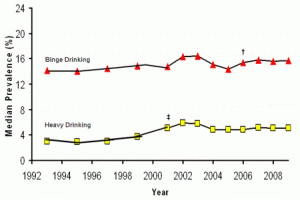Are You Sure You’re Just a Casual Drinker?
 It’s may not commonly known, but there is a fine line between casual drinking and binge drinking. Binge drinking is typically defined as a pattern of excess drinking where a person has four or more drinks in the span of two hours. This form of drinking can be deleterious to the drinker’s health and judgment, and can also place the drinker and those around him or her into a variety of dangerous situations.
It’s may not commonly known, but there is a fine line between casual drinking and binge drinking. Binge drinking is typically defined as a pattern of excess drinking where a person has four or more drinks in the span of two hours. This form of drinking can be deleterious to the drinker’s health and judgment, and can also place the drinker and those around him or her into a variety of dangerous situations.
If so many people are binge drinking without great cause for concern, does this mean that it’s okay for you? The answer from the experts is a resounding no. Binge drinking over a period of time can cause brain damage and impair brain receptors responsible for memory and learning, and it is young people who are especially vulnerable to alcohol-related brain damage, according to researchers at Duke University. It is known that alcohol impairs judgment while one is under its influence, but this particular study has shed some light on the long-term effects of alcohol binges.
Duke University researchers performed an experiment on a group of “adolescent” rats and a group of mature rats by giving them alcohol in a fashion that mimicked the binge drinking pattern over a period of 20 days. After another sober 20 days, the groups were rated on their ability to navigate through a maze. After comparing the results, it was noted that the performance between the groups was no different until the researchers gave the rats alcohol again. The adolescent group performed terribly and made the most errors compared to the mature rats, leading researchers to the conclusion that chronic drinking at a young age could have lifelong deleterious effects on the mind.
It’s not just the health of the brain that is affected by binge drinking — the rest of the body is just as vulnerable. Aside from nasty acute effects like vomiting, morning hangovers and potentially-fatal alcohol poisoning, regular binge drinking over a period of time can lead to a variety of bodily health afflictions. This includes injury to all of the vital organs, causing weight gain, cardiovascular disease and obesity, and even causing certain kinds of mouth, throat, liver and breast cancers.
Lastly and most importantly, binge drinking endangers the lives of people around the drinker. As mentioned before, alcohol is an intoxicant that is known to impair judgment, and the effects of alcohol are multiplied when a large quantity is consumed in a short amount of time as it is in the manner of binge drinking. It should come as no surprise that binge drinking leads to bodily injury, but this form of drinking is linked to many physical injuries, both accidental and intentional. According to the CDC Binge Drinking Fact Sheets, binge drinking is tied to or responsible for car crashes, drownings and sexual assault, among other dangerous situations. It is also mentioned in the CDC Fact Sheets that binge drinkers are 14 times more likely to report driving under the influence than more moderate drinkers.
Despite the prevalence and apparent acceptance of binge drinking, there are solutions. The CDC cites some evidence that limiting the availability of alcohol, including raising its price and restricting when and where it is sold seems to decrease the prevalence of binge drinking. Finally, awareness and responsible alcohol consumption in moderation can alleviate the dangers of binge drinking. However, if you suspect that you or someone close to you are engaging in binge drinking or alcohol abuse, and moderation doesn’t seem to be an option, professional help is available. Binge drinking does not have to be a problem for everyone.